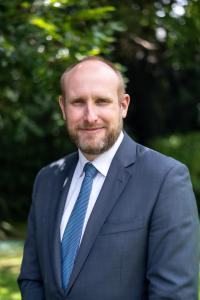South African party politics is undergoing a transformation characterised by a gradual decline in support for the African National Congress (ANC), the ruling party. Although the ANC has won uninterrupted elections since 1994, its share of the vote has steadily declined, reaching a record low of 57.5 % in the 2019 national elections. The declining support for the ANC has led to a debate about the percentage of votes it could receive in the 2024 national elections, with polls suggesting that it could fall below 50%. This development raises the question of the possibility of a coalition government at national level, and which parties might be involved. As South Africa does not have a long history of coalition building, there are concerns about the stability of such a government. In particular, the ANC's practice of "cadre deployment", whereby people are appointed to key positions at government level based on their loyalty to the party rather than their competence, can be seen as a further cause of widespread corruption and mismanagement. This politicisation of the civil service has further exacerbated the already complicated link between governance and administration in the context of coalition building.
The debate around this "complex political-administrative dilemma" was taken up by the Konrad-Adenauer-Stiftung in the organised masterclass "Coalition Governance Leadership in South Africa", which took place in Cape Town on the 7th and 8th November 2023. The event brought together various politicians at local, regional and national level and various opposition parties to shed light on the complex aspects and potential benefits of functioning coalitions. By analysing various case studies and current examples from South African politics, a practical reference was created. Furthermore, the workshop was designed to allow for significant discussion among participants, thereby seeking to draw out key insights from the current status in coalitions. Welcome remarks by the Resident Representative for South Africa Gregor Jaecke were followed by an input and explanation of the Schwella Leadership Model from Prof. Erwin Schwella and discussion sessions with various worksheets on legal frameworks, interests of coalition partners, negotiations in coalitions and mutual gains. Ambrose du Plessis from the University of the Free State provided an important analysis on the political-administrative interface in a coalition-led Metropolitan Municipality through his presentation. For a legislative and policy context, Karel van der Molen from Stellenbosch University evaluated ethical practices in coalitions in the context of "what is right, what is good and what is proper” to achieve a common goal with regards to building a coalition.
The two days’ workshop concluded with plenary feedback on the presentations, a fruitful discussion and closing remarks by the organisers. Important takeaways included the relevance of good governance as a foundation and party politics as a prime driver in system dynamics. In the words of one participant, "coalitions can do good but also bad." The masterclass was able to make an important contribution to the topic of coalition building in South Africa, with particular reference to a thoughtful and wiseful leadership approach and working human-centred with the people. Furthermore, the aim of building self-confidence for effective leadership in coalitions, raising awareness of coalitions in the political culture and further strengthening good governance in the South African democratic system was achieved. The results emphasise the importance of taking a closer look at coalitions in the South African party landscape because, as the speaker Ambrose du Plessis states: "When political heads and administration are at odds, citizens pay the price."
The theme "Coalition Government" will be discussed further on December 5 and 6, 2023 with CiviNovus and Prof. Erwin Schwella in a conference on how civil society and citizens can support the transition to South Africa's coalition future and preserve the country's liberal democracy. The event is open to the public and prior registration is required.



